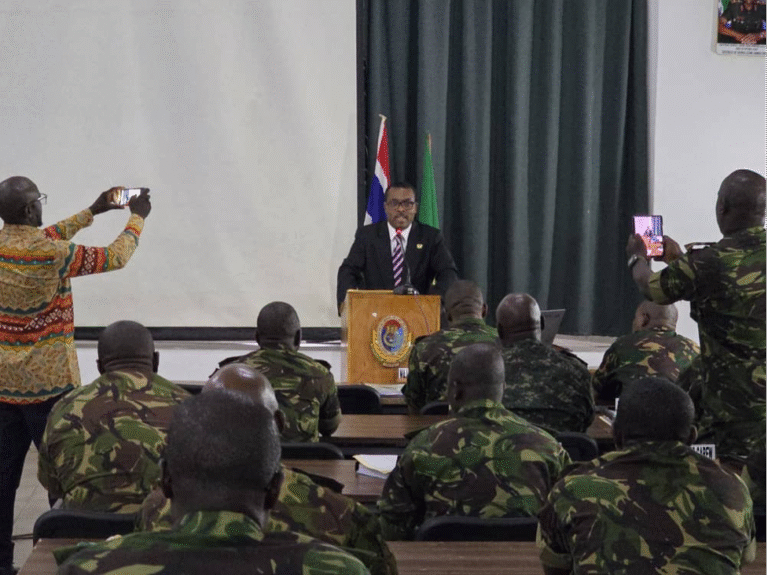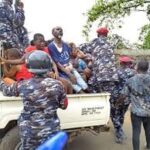By Jarrah Kawusu-Konte
Freetown – 24th July, 2025
On a rainy July morning in the New England community of Freetown, the earth gave way. A once-humble home tucked beneath the hills was crushed beneath the weight of water and concrete. The deluge claimed four lives: Saloh Sesay, 70, a grandmother, and her three grandchildren — Aminata Turay (8), Alie Turay (2), and Ramatu Turay (1 year and 6 months). The children’s father, Alie Turay and his wife Nancy, survived. But what does survival mean when the world you knew is gone?
This was not a freak accident. It was a tragedy foretold, written into the slopes of deforested hills, echoed in the roar of unregulated construction, and cemented in the quiet complicity of decades of environmental neglect.

Freetown is a city of breathtaking beauty. Its verdant hills embrace the sea in an eternal dance of emerald and azure. Rivers carve through the valleys, mangroves whisper secrets to lagoons, and golden beaches curl into the Atlantic like delicate fingers. But this same majestic topography now bleeds from a thousand wounds, inflicted by bulldozers, choked by plastic, suffocated under concrete.
Where once forest canopies cooled the soil and cradled the rainfall, there is now bare earth, exposed and brittle. Satellite imagery shows alarming shrinkage of forest cover around Freetown’s hills. The city has lost over 40% of its tree cover, according to the World Resources Institute’s Global Forest Watch platform. The deforestation has as much degraded the environment as it has deeply compromised slope stability. In a tropical region with intense seasonal rains, the combination is lethal.

The collapse in New England is the latest heartbreak in a series of similar tragedies. From Mortormeh to Culvert, from Mount Sugar Loaf to Kroo Bay, Freetown’s natural defenses have been stripped by the twin forces of poverty and poor governance. As urban populations swell and economic opportunities remain centralized in the capital, vulnerable families are pushed to the margins — literally and figuratively — into the ravines, gullies, and steep peripheries of the city.
Saloh Sesay and her grandchildren were not victims of fate, but of systemic failure.
The Unseen Weight of Injustice
“Nobody wants to live in danger,” a community elder lamented as youth volunteers continued digging through the rubble. “But if this is all you can afford, what choice do you have?”

The roots of this tragedy lie not just in the soil, but in the structure of Sierra Leone’s socio-economic imbalance. When viable opportunities are not distributed across the country, when investments, jobs, healthcare, and education remain clustered in Freetown, then migration to the capital becomes not a choice, but a compulsion.
And so, the city sprawls. Not through planning, but through desperation.
Environmental theorists like Amartya Sen have long warned that entitlement failure the inability of citizens to access what they need for survival, is often more lethal than nature itself. The floods and landslides we mourn are not only ecological events; they are symptoms of deeper inequality. They expose how Sierra Leone’s development trajectory has bypassed rural regions and failed to provide social housing for low-income families in urban areas.
A Future That Learns from Pain
But pain, as the late Kenyan scholar Wangari Maathai reminded us, can be fertile soil for new beginnings. “When we plant trees, we plant the seeds of peace and hope,” she once said. Freetown must now plant those seeds, literally and figuratively.
This is where leadership matters. And where foresight must replace slogans.
Dr. Ibrahim Bangura, a peace and development expert with a background in public policy, has quietly but persistently warned about the cost of failing to act. While his campaign has avoided exploiting tragedies for political gain, he has consistently advocated for a comprehensive national development plan, regional development hubs to reduce over-congestion in Freetown, and a national disaster risk management strategy with decentralized response teams. These, he emphasised, must be implemented with fidelity.
Under a Dr. Bangura administration, policy priorities will include:
Establishment of social and affordable housing schemes for low-income earners across all regions, not just the Western Area.
National reforestation and hilltop protection initiative leveraging community youth and technology.
Enforcement of zoning and building codes, with local councils equipped and held accountable.
Climate-resilient infrastructure and early warning systems in disaster-prone areas.
Strategic decentralization of public services to ensure rural and provincial towns become attractive, livable, and economically vibrant.
But beyond policy, what Sierra Leone needs is a shift in how it values life, dignity, and space. The nation must reject the culture of reactive grief and embrace the discipline of preventive care. It must cease treating the poor as invisible and start planning as if every life matters — because it does.
A Father’s Silence, a Nation’s Wake-Up Call
As Alie Turay sat beside what was once his home, his face bore the unbearable stillness of a man broken beyond words. He is not alone. He carries the grief of a city that has wept too often, for too long.
Let his pain not be buried under the next landslide.
Let this moment stir more than condolences.
Let it plant a resolve to protect the land, the lives, the future.
Let us heal, unite, and build back better.







